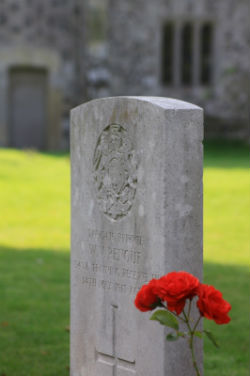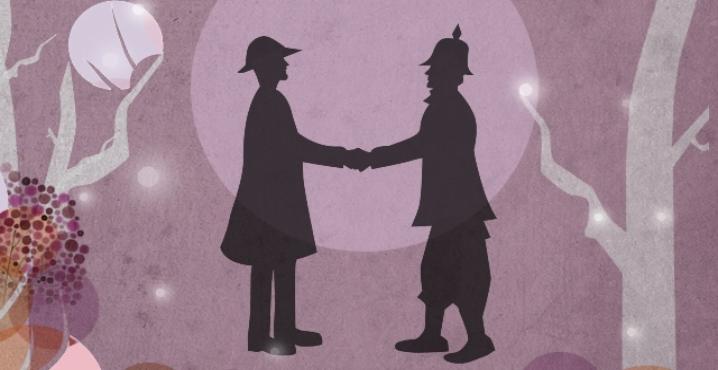How should churches mark the First World War?
Nick Megoran and Andii Bowsher explore how we can proclaim the Christian message in First World War commemorations
 Between 2014 and 2018 the UK will mark the centenary of the First World War. That more than 15 million people died in a conflict marked by new forms of weaponry and warfare is widely accepted, but interpretations of the war continue to divide opinion. Was it a ‘futile’ waste of a generation? ‘Lions led by donkeys’? A clash of imperial powers? ‘Organised murder, nothing else,’ as Harry Patch, Britain’s last surviving veteran, described it? Or was it a just war to check German militarism and liberate Belgium?
Between 2014 and 2018 the UK will mark the centenary of the First World War. That more than 15 million people died in a conflict marked by new forms of weaponry and warfare is widely accepted, but interpretations of the war continue to divide opinion. Was it a ‘futile’ waste of a generation? ‘Lions led by donkeys’? A clash of imperial powers? ‘Organised murder, nothing else,’ as Harry Patch, Britain’s last surviving veteran, described it? Or was it a just war to check German militarism and liberate Belgium?
Given these debates, it is unsurprising that marking the war has already been contentious. In 2012, when announcing major plans to fund four years of commemoration, Prime Minister David Cameron caused controversy by saying that he looked forward to ‘A commemoration that captures our national spirit in every corner of the country... that, like the Diamond Jubilee celebrations this year, says something about who we are as a people.’
For example, the government is laying commemorative paving stones in the birth place of every World War I Victoria Cross recipient, to ‘provide a lasting legacy of local heroes.’ Yet Great War memorials rarely record either rank or medals, but are starkly simple alphabetical lists of all those who had their lives taken from them. Generally they are mournful, not heroic.
Yet by singling out as ‘heroes’ only those men who received the top military award, the government is tearing up a century of practice. Some see this as the continuation of a programme initiated by the previous Labour government to counter public scepticism about the military in the wake of the 2003 Iraq invasion.
Commemoration is thus inescapably political – it always tells a particular story about the past and the present. But too often churches sleepwalk into remembrance, following the state’s lead instead of thinking theologically for themselves. This is both an unhealthy way to do church, and a dangerous one. We need to pause and ask ourselves, ‘What is the point of church commemoration of war?’
To answer that question, we have to step back even further and pose a more fundamental one: ‘What is the point of the church at all?’ Anglican Bishop George Bell helps us in his classic 1939 essay where he asks, ‘What is the church’s function in war-time?’ The answer he gives is simple: ‘it is the function of the Church at all costs to remain the Church’, that organisation which is the trustee of the ‘gospel of redemption,’ and ‘the pillar and ground of the truth’ (1 Timothy 3: 15, KJV).
the church’s function in a period of war commemoration is not to tell a national story, but to tell the Christian story
We forget that at our peril. Baptist minister Martin Luther King lamented that during World War 1 “national churches even functioned as the ready lackeys of the state, sprinkling holy water upon the battleships and joining the mighty armies in singing, 'Praise the Lord, and pass the ammunition.’” This led to a widespread post-war reaction against the church.
To paraphrase Bell, therefore, the church’s function in a period of war commemoration is not to tell a national story, but to tell the Christian story. It is to proclaim ‘the Gospel of peace’ (Ephesians 6: 15), made possible by the incarnation of Christ that first Christmas and his death and resurrection at Easter. That is as true in war as in peace time. As independent minister Martyn Lloyd-Jones preached in Westminster Chapel as World War 2 broke out: war is ‘a consequence and a manifestation of sin’, and the gospel is its remedy - as it is the remedy of all sin.
So, how can we proclaim the Christian message as we commemorate World War 1?
 The upcoming centenary of the famous December 1914 Christmas Truces provides a unique opportunity to present the Christian message afresh. Tens of thousands of troops right down the western front stopped fighting to celebrate the birth of the ‘Prince of Peace.’
The upcoming centenary of the famous December 1914 Christmas Truces provides a unique opportunity to present the Christian message afresh. Tens of thousands of troops right down the western front stopped fighting to celebrate the birth of the ‘Prince of Peace.’
To the fury of their respective high commands they met in no man’s land to sing carols, bury the dead, exchange gifts, share festive food and drink, swap names and addresses, pose for photographs, and play football. In some places they conducted joint Christian services with prayers and scripture readings in both languages – an astounding glimpse of the new heavens and earth when a multitude from ‘every nation, tribe, people and language’ will worship the Lamb (Rev 7:9).
The extraordinary events of 100 Christmases ago are easy to celebrate this year. The Martin Luther King Peace Committee has produced free resources and service plans to help schools and churches run Christmas Truces-themed carol services, school assemblies and Sunday School activities. The order of service uses voices from the trenches and no-man's land to weave the story of the Truces in with the story of the nativity as presented in the traditional carol service. Hope Together has released evangelistic material to stage ‘Silent Night’ events in football stadia.
Churches can use these resources to invite our communities to engage afresh with the Christmas message. For example, encourage schools to use the resources to produce truces-themed art shows, and invite them to stage displays in church for the carol service. Ask forces personnel from a local regiment to read out the evocative extracts from their forerunners who took part in the truces.
As the UK marks the Great War’s centenary, the church should ask itself some hard questions about how it does remembrance. Commemoration can never be apolitical: interpretations of the past and contemporary politics inevitably blend with the laying of wreaths and the wearing of poppies. It is not the point of the church to adjudicate historical debates or advance partisan political agendas, but to fulfil its primary task of bearing witness to the gospel of redemption. Yet too often instead of making disciples of all nations, churches stage remembrance events that divide Jesus’ disciples back into nations.
So let us join with others in marking World War 1. But let us remember above all that it is the job of the church to bring a Christian perspective to the nation, not a national perspective to the church.
Nick Megoran and Andii Bowsher are co-convenors of the Northumbria and Newcastle Universities Martin Luther King Peace Committee. Nick is a lecturer at Newcastle University and Elder of Heaton Baptist Church, and Andii is a chaplain at Northumbria University
Baptist Times, 14/10/2014